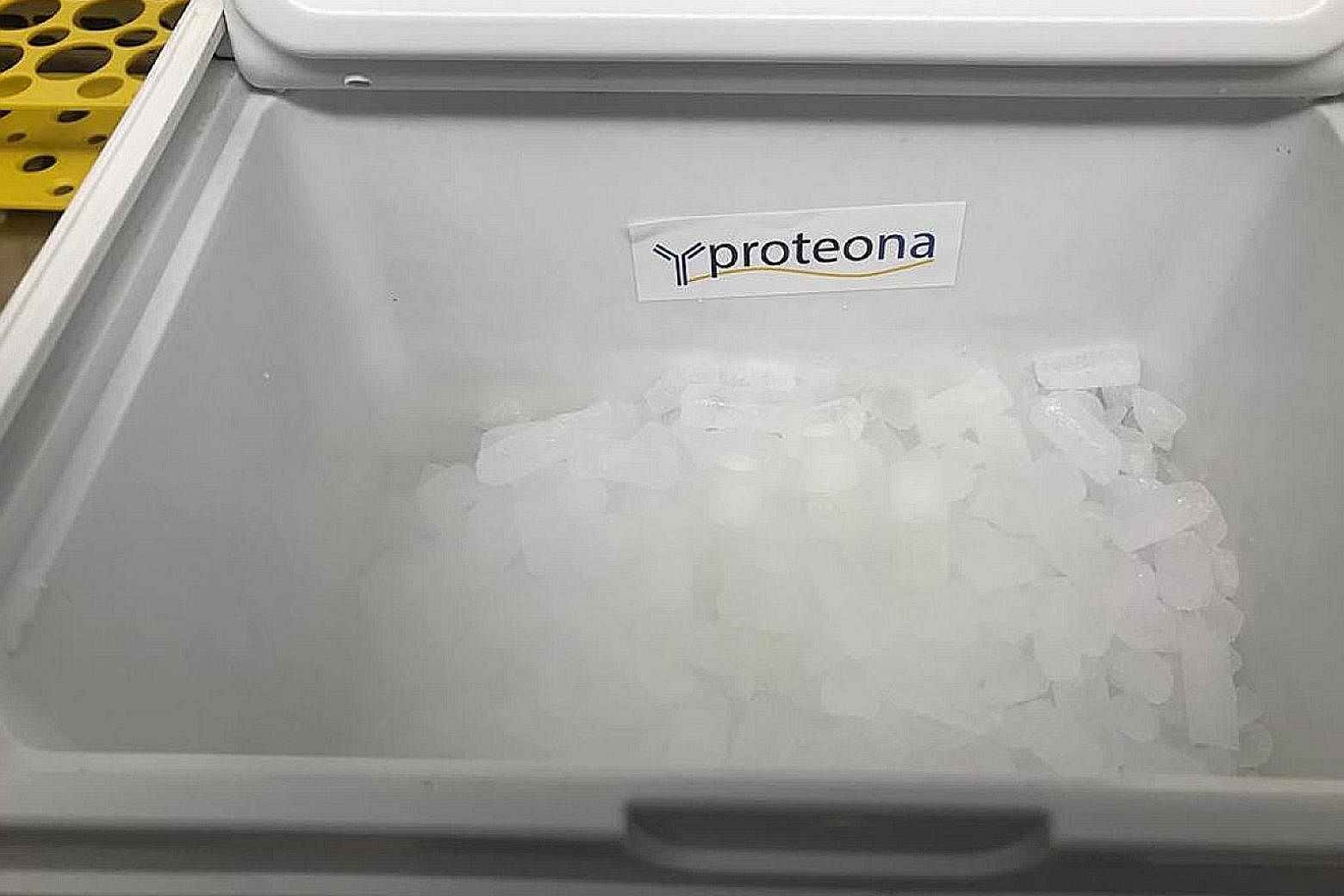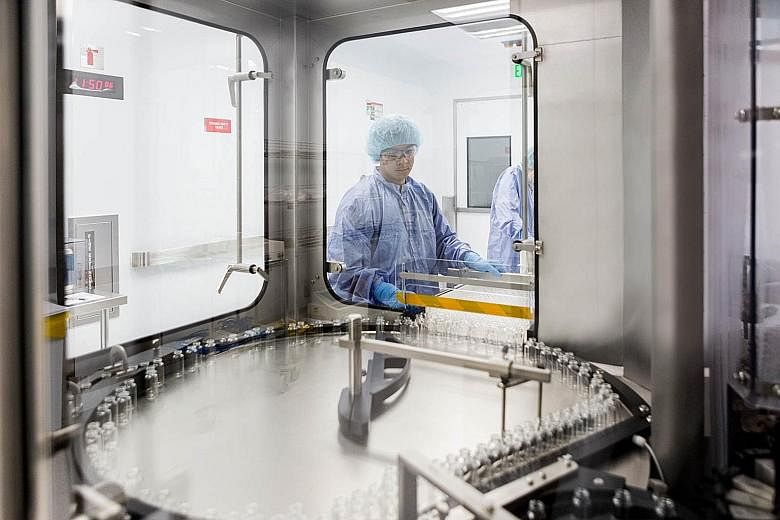Time can run out quickly for the fragile living cells, shipped internationally on dry ice at minus 80 deg C for Covid-19 research.
But as drug manufacturers and biotechnology firms scramble to develop Covid-19 therapeutics and diagnostic test kits, the virus itself has created conditions that make their task harder.
For effective research, the patient samples must arrive in time. But the Covid-19 outbreak has caused borders to close, countries to go into lockdown, flights to grind to a halt and shipping routes to be reduced. This means delays.
"We analyse blood cells from individuals who recovered from Covid-19 to look for cells that produce neutralising antibodies against coronaviruses. Some of these single cells get shipped on dry ice too," multinational biomedical firm Proteona's chief executive Andreas Schmidt told The Straits Times.
"If the dry ice is completely gone, the cells die," he added. "We experienced various delays but were lucky enough not to lose a single sample."
Local biotechnology firm ImmunoScape, which orders re-agents, consumables and other laboratory supplies from the United States and Australia, has weathered the storm better than most.
"Our supply chain has not been adversely affected since the start of Covid-19 in late January, and we are probably one of the lucky ones," chief executive Ng Choon Peng told ST.
"We are usually well prepared and well stocked up, ready to start projects with global biopharmaceutical companies. Prior to the pandemic, we were 80 per cent stocked up," he added.
The battle against the virus is about logistics as well as research, and industry players like biotech company Heat Biologics, headquartered in the United States, which is conducting vaccine development by activating the T cell arm of the immune system, are fighting their way through.
MOVING TOWARDS SELF-SUFFICIENCY
Being completely reliant on imports has made domestic firms vulnerable to sudden supply shocks, prompting home-grown biotech company Esco Aster to begin a quest towards self-sufficiency.
Esco Aster is expanding its current factory in Changi with capabilities to make raw materials for polymerase chain reaction (PCR) test kits, which include PCR enzymes that come from the fermentation of microbes.
The site will be operational by the end of the year.
The microbes will also be genetically modified to support its vaccine development programme.
"When delays happen now, which usually take us an extra few weeks, we have no choice but to patiently wait," Esco Aster's chief executive Lin Xiangliang told ST.
"We are now building up some form of self-sufficiency to help us weather future supply shortages."
DIVERSIFICATION OF THE SUPPLY CHAIN
For Proteona, having a large stockpile of raw materials is impractical as supplies expire within a few weeks and hence need to be constantly shipped in.
"We came up with new partnerships; new collaborations that would have otherwise taken many months to build," Dr Schmidt said.
It also tapped less conventional partners, such as calling on family doctors from around the world to collect reconvalescent Covid-19 blood - blood from previously infected patients who are no longer infectious - to manage its international Covid-19 blood draws. The blood will be used for research on antibodies against the virus.

"It was amazing to receive their help and commitment after just one phone call," Dr Schmidt added.
Meanwhile, drugmaker Gilead Sciences aggressively scaled up production of its investigational antiviral drug remdesivir.
Remdesivir, originally designed to combat Ebola, has recently shown promise in fighting the coronavirus and, as of Monday, is available in Singapore through clinical trials.
Gilead looked at expanding its network of manufacturing partners and went into long-term voluntary licences with several generic drugmakers - by transferring the technology to them - in order to scale up supply of remdesivir.
STREAMLINING PROCESSES
Companies are in a constant race against time as the pandemic unfolds, prompting many to also streamline existing processes, plan ahead and find alternatives for their supplies.
For instance, Gilead substantially shortened its manufacturing lead time for remdesivir.
"The production of remdesivir is a long linear chemical synthesis process that must be completed sequentially," said Ms Venus Tsang, Gilead Sciences' senior director of public affairs for Asia.
"The typical timeline for manufacturing remdesivir at scale is nine to 12 months. But by optimising the chemical synthesis processes, we have reduced that period to six to eight months," Ms Tsang added.
For Proteona, it has tapped operations in Singapore, Germany and the US. Since the pandemic hit at slightly different times across the globe, the company could carry out its laboratory work in different parts of the world to make up for shortfalls that a certain sector might be facing.
Biotech company MiRXES also saw its own supply chain for certain raw materials getting hit by the pandemic, resulting in delivery lead times being extended from days to weeks.
The company imports raw materials for its Fortitude Kit RT-PCR test and processes the raw materials to produce clinical-grade reagents, before packaging them in a user-friendly way. The kits are exported to more than 20 countries.
"Planning well in advance in anticipation of bottlenecks as we ramped up our production schedule of Fortitude Kit was crucial," said Dr Zhou Lihan, co-founder and chief executive officer of MiRXES.
From 100,000 tests a week in mid-February, the firm is mass-producing 400,000 tests a week now.
Meanwhile, Johnson & Johnson (J&J) overcame logistical challenges by working closely with local governments and suppliers.
For instance, by ensuring a safe work environment in its manufacturing plants, J&J managed to secure exclusions for workers to return to work in China while the country was still in lockdown, helping to relieve manpower shortages.
Additionally, with commercial flights grinding to a halt, J&J can rely only on cargo flights to deliver its supplies, so forward planning was also critical to ensure timely delivery of cargo.
Global healthcare company GSK was also not spared supply delays.
"We experienced some delays in imports such as raw materials and consumables but have arranged for alternative transport methods and suppliers, where feasible," a GSK spokesman said, adding that it managed to sidestep significant disruptions.












